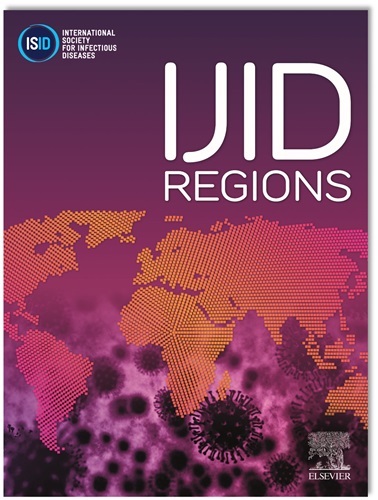Impact of the LGBT+ rights on reporting cases and deaths of Mpox globally: Relationships with the LGBT+ rights index during 2022-2024 epidemics
IF 4.8
2区 医学
Q1 INFECTIOUS DISEASES
引用次数: 0
Abstract
Introduction
Multiple aspects of the epidemics of mpox during 2022-2024 have been explored, including clinical features, diagnostic aspects, therapies and vaccines. However, factors associated with reporting of cases and death of Mpox have been poorly assessed. No studies regarding the relationships between the LGBT+ rights and the morbidity and mortality from Mpox have been published yet.
Methods
An ecological study for 106 countries was done using the LGBT+ rights index (LGBT-RI) per country that were obtained from the State Sponsored Homophobia Reports produced by ILGA, LexisNexis, Factiva, Amnesty International, Human Rights Watch, the U.S. State Department, and Velasco report (2020), from Our World in Data, and the cases, calculating the incidence rates (cases per 100,000 pop.), from the U.S. Centers for Disease Control (CDC) and the World Health Organization (WHO). Also, mortality rates (cases per 100,000 pop.) and case fatality rates (deaths per 100 cases, %CFR) were calculated. The annual variation of the variables was assessed, and non-linear regression models (exponential) were done at Stata/MP® v.14.0.
Results
The non-linear regression models revealed significant findings. The relationship between epidemiological factors and LGBT-RI was found to be significant. During this epidemic, there was a positive relationship between LGBT-RI and reported of Mpox cases (r2=0.1006; p=0.0040), countries with higher LGBT-RI had higher Mpox cases. Similarly, higher LGBT-RI values were also significantly associated with higher Mpox incidence rates (cases/100,000 pop) (r2=0.5062; p<0.0001). Number of deaths notified were also associated with the LGBT-RI (r2=0.0636; p=0.0328). Consistently, the Mpox mortality rate was also associated with the LGBT-RI (r2=0.1390; p=0.0005). Finally, the %CFR, as expected, this variable was not associated with LGBT-RI (r2=0.0216; p=0.3287).
Discussion
These findings underscore the significant influence of stigma and discrimination that may be associated with Mpox. In particular, the LGBT+ rights allow trust in the health system, diagnostic and management. At the same, the proper notification of a Mpox case and its associated outcomes. Even in 2024, there are 88 countries or territories, specially in Africa, Middle East, and Asia, that have not reported yet, even a single case of Mpox. Even in Latin American and the Caribbean, ten countries are included in that list. Despite the epidemics of 2022-2024, Mpox remains a neglected condition worldwide, with a resurgence in countries like the Democratic Republic of Congo in 2023-2024. The need for further studies on multiple epidemiological factors of Mpox is therefore paramount.
Conclusion
Sexual rights still influence not just HIV and other sexually transmitted infections epidemiology, but also of the reemerging/emerging Mpox globally.
LGBT+ 权利对全球麻风腮病例和死亡报告的影响:2022-2024 年疫情期间与 LGBT+ 权利指数的关系
对2022-2024年期间m痘流行的多个方面进行了探索,包括临床特征、诊断方面、治疗和疫苗。然而,与麻疹病例报告和死亡有关的因素评估不佳。目前还没有关于LGBT+权利与Mpox发病率和死亡率之间关系的研究发表。方法对106个国家进行了一项生态研究,该研究使用了来自ILGA、LexisNexis、Factiva、大赦国际、人权观察、美国国务院和Velasco报告(2020)的国家赞助同性恋恐惧症报告中获得的LGBT+权利指数(LGBT- ri),以及来自美国疾病控制中心(CDC)和世界卫生组织(WHO)的病例,计算发病率(每10万人的病例)。此外,还计算了死亡率(每10万人的病例数)和病死率(每100例死亡,%CFR)。评估变量的年度变化,并在Stata/MP®v.14.0中进行非线性回归模型(指数)。结果非线性回归模型显示了显著的结果。流行病学因素与LGBT-RI的关系显著。在本次流行期间,LGBT-RI与m痘病例报告呈正相关(r2=0.1006;p=0.0040), LGBT-RI较高的国家有较高的m痘病例。同样,较高的LGBT-RI值也与较高的m痘发病率(病例/100,000人)显著相关(r2=0.5062;术中,0.0001)。通报的死亡人数也与LGBT-RI相关(r2=0.0636;p = 0.0328)。同样,Mpox死亡率也与LGBT-RI相关(r2=0.1390;p = 0.0005)。最后,正如预期的那样,%CFR与LGBT-RI无关(r2=0.0216;p = 0.3287)。这些发现强调了可能与Mpox相关的耻辱和歧视的重大影响。特别是,LGBT+权利允许对卫生系统、诊断和管理的信任。同时,适当通报麻疹病例及其相关结果。即使到2024年,仍有88个国家或地区,特别是非洲、中东和亚洲的国家或地区,尚未报告甚至一例麻疹病例。即使在拉丁美洲和加勒比地区,也有10个国家被列入该名单。尽管在2022年至2024年期间流行,但Mpox在世界范围内仍然是一种被忽视的疾病,在2023年至2024年期间在刚果民主共和国等国家卷土重来。因此,对Mpox的多种流行病学因素进行进一步研究是至关重要的。结论性权利不仅影响着艾滋病毒和其他性传播感染的流行病学,而且影响着全球再发/新发Mpox。
本文章由计算机程序翻译,如有差异,请以英文原文为准。
求助全文
约1分钟内获得全文
求助全文
来源期刊
CiteScore
18.90
自引率
2.40%
发文量
1020
审稿时长
30 days
期刊介绍:
International Journal of Infectious Diseases (IJID)
Publisher: International Society for Infectious Diseases
Publication Frequency: Monthly
Type: Peer-reviewed, Open Access
Scope:
Publishes original clinical and laboratory-based research.
Reports clinical trials, reviews, and some case reports.
Focuses on epidemiology, clinical diagnosis, treatment, and control of infectious diseases.
Emphasizes diseases common in under-resourced countries.

 求助内容:
求助内容: 应助结果提醒方式:
应助结果提醒方式:


